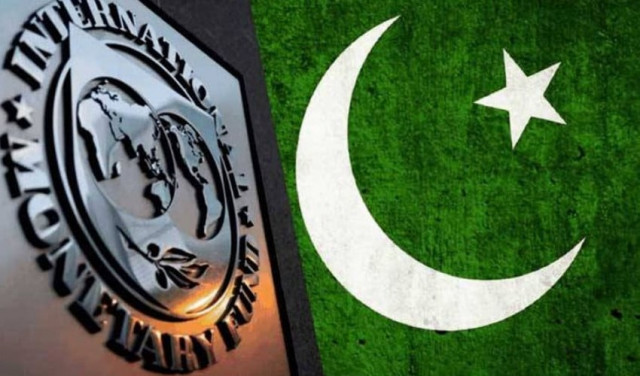Punjab breaches IMF condition
Falls short of Rs342b provincial cash surplus goal by Rs182b in first quarter

Pakistan has failed to meet a major condition of the International Monetary Fund (IMF) to generate Rs342 billion in cash surplus by the four provincial governments due to Punjab's lower-than-estimated cash surplus during the first quarter of this fiscal year. The provincial governments missed the condition by a margin of Rs182 billion or 53%, underscoring serious challenges in the implementation of the $7 billion IMF deal.
Instead of the Rs342 billion target, the provinces cumulatively posted a cash surplus of Rs160 billion, according to interim data compiled by the federal government based on inputs from provincial finance departments. Finance Ministry spokesman Qumar Abbasi was not available for comments.
However, the provincial governments did meet another IMF condition, collecting Rs184 billion in taxes during the July-September quarter. The federating units surpassed the target by a margin of Rs29 billion, collectively raising Rs213 billion, according to officials.
Pakistan has accepted about 40 conditions in return for the $7 billion deal. The IMF has set quarterly targets to ensure that the programme's objectives of fiscal discipline, debt burden reduction, and rebalancing the centre-provincial relations are achieved. The $7 billion Extended Fund Facility (EFF) also aims at external sector viability on the back of debt rollovers.
Under the IMF deal, the four provincial governments are required to generate a cash surplus totalling Rs1.217 trillion in the current fiscal year. For the first quarter, the target was Rs342 billion. However, these governments missed the goal by Rs182 billion, according to the officials.
The shortfall was primarily due to Punjab's failure to produce the required surplus, officials said. The provincial government retired its commodity-related commercial debt, which resulted in lower cash surpluses.
Punjab Finance Secretary Mujahid Sherdil did not respond to a request for a comment.
This marks the third major IMF condition that Pakistan has missed so far. The federal government also failed to achieve the Rs2.652 trillion quarterly Federal Board of Revenue (FBR) target and could not collect Rs10 billion from the traders under its new scheme. Instead of the Rs10 billion target, around Rs1 million was collected.
Concerns have been raised about the ambitious targets set under the IMF deal, and early results suggest it may be difficult for Pakistan to meet some of the 40 conditions.
Reuters on Thursday quoted Finance Minister Muhammad Aurangzeb as saying that Pakistan was targeting another $1 billion climate finance loan from the IMF.
Under the National Fiscal Pact, the four provincial governments signed on to generate the cash surplus and meet other targets. Unlike in the past, the success of the $7 billion IMF deal hinges upon improved fiscal performance by both the federal and provincial governments.
The IMF staff report released this month stated, "The federal and provincial governments have agreed on the programme's fiscal strategy and the required provincial surpluses, and for provinces to deliver surpluses of around 1% of GDP in fiscal year 2025".
The report further stated that the federal government and provinces had also agreed to enter a National Fiscal Pact that will devolve specific federal spending responsibilities to provinces, in line with the 18th constitutional amendment.
However, the IMF report also acknowledged that there were several areas where conditionality for a new arrangement will likely need to evolve to address the emerging risks and priorities. First, with slippages at the provincial level undermining fiscal performance, provincial governments need to play a larger role in ensuring general government surpluses, both through revenue mobilisation and expenditure restraint, it added.
Sources said the provinces spent Rs1.75 trillion during the first quarter, a year-on-year increase of Rs427 billion or 33%. Provincial governments enjoy large fiscal flexibility due to increased revenues under the National Finance Commission (NFC) award.
The four provincial governments spent about Rs1.22 trillion on current expenditures – 28% more compared to a year ago. Development spending by the four federating units amounted to Rs257 billion – up by only 4%.
Sources revealed that provincial revenues totalled Rs1.9 trillion, largely due to their NFC shares. Out of this, the federal government transferred Rs1.6 trillion. The NFC transfers rose by 44% compared to a year ago. Under the NFC award, provinces receive 57.5% of the federal tax collection.
The federating units also generated Rs213 billion independently – up by Rs38 billion or 22%. The IMF had set a target of Rs184 billion for provincial tax collection, which was met.
Sales tax on services collection stood at Rs122 billion, a 15% increase over last year. However, the provinces' collection of stamp duties marginally decreased to Rs14.6 billion during the first three months of this fiscal year.



















COMMENTS (1)
Comments are moderated and generally will be posted if they are on-topic and not abusive.
For more information, please see our Comments FAQ